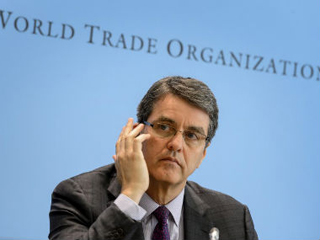
In two separate statements the European Union and an Australia-led group of more than two dozen countries have asked India not to veto the Trade Facilitation Agreement (TFA) of the World Trade Organization (WTO). "A decision to step away would be in no one's interest. It would seriously undermine the ability of the WTO to deliver for the future," warned the 25-country group led by Australia.
"In practice, it would also block the new capacity building initiatives to assist WTO Members implement the TFA. The new economic growth and jobs that are expected to flow from the implementation of the TFA would not become a reality. It would fundamentally undermine the prospects for progress on the post-Bali work program for the Doha negotiations and on the other decisions that Ministers took in Bali," the Australia-led statement said.
India has made it clear that it will not yield to the pressure of developed nations on pushing the WTO's Bali agreement on trade facilitation agreement without addressing New Delhi's concerns on food security issues. The matter was discussed in the Union Cabinet on Thursday.
India wants a concrete framework on finding a permanent solution for India's public stock holding issue and without that New Delhi will not adopt the TFA protocol.
Sharp differences have emerged between rich economies like the US and Australia and emerging nations, including India and South Africa, on implementation of the Bali package.
In a separate statement, the European Union said without adoption of the Trade Facilitation Protocol by July 31 a great opportunity to mobilise trade as an instrument for growth and development would be lost, and the credibility of the WTO, which has during the financial crisis proven its value as a firewall against protectionism, would be further damaged.In an apparent reference to India's concerns, the European Union said on food security, Bali meeting provided an open-ended solution which addresses effectively the concerns while WTO members continue to work for a permanent solution.
"So far, WTO members have jointly respected and honoured the Bali commitments. Serious work has been done over the last months and good progress been made, including on issues of interest to developing and least developed countries," it said.
"The proper and timely implementation of the Bali package as agreed by Ministers is of crucial importance to the WTO and all WTO members," the European Union added. "Without adoption of the Trade Facilitation Protocol by July 31 a great opportunity to mobilise trade as an instrument for growth and development would be lost, and the credibility of the WTO, which has during the financial crisis proven its value as a firewall against protectionism, would be further damaged," it said.
Urging member nations to respect the decisions taken by Ministers in Bali, the statement said the European Union is not ready to renegotiate basic elements or timelines that were agreed as integral part of the Bali package. "The EU is ready to work with all members to find a solution by the 31 July for Trade Facilitation and to intensify work for satisfactory and timely progress on all aspects of the Bali Ministerial decisions in accordance with the mandate," it said.






Comments
Add new comment